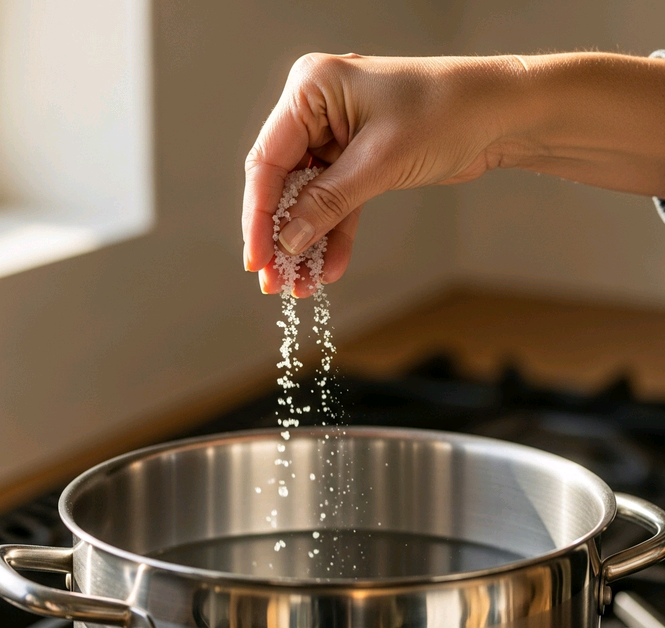Why you should never salt a cold pot of water
Boiling water is a fundamental step in many cooking processes, from preparing pasta to boiling potatoes. Many recipes call for salt to be added to boiling water, and chefs often emphasise the importance of this step. But have you ever wondered why it’s necessary to add salt and when exactly to do it? In this article, we will debunk common myths and look at the reasons for adding salt to boiling water.
The truth about salt and boiling water
Let’s look at some misconceptions about salting boiling water. A common myth is that adding salt to water raises its boiling point. While this is technically true, the amount of salt required to significantly raise the boiling point is impractical. You would need an inordinate amount of salt, much saltier than the ocean, to make a noticeable difference. Therefore, the idea of salting water to make it boil faster is also unfounded. Water boils at the same temperature regardless of its salt content.
The purpose of salting water
So if salt doesn’t affect boiling point or speed, why do recipes recommend adding it to boiling water? The main reason is to enhance the flavour of the food you are cooking. If salt is added at the right time, it will season the water and this flavour will be absorbed by the ingredients. It’s important to be generous with your salting, but timing is key.
The importance of timing
According to Hestan cookware expert Pamela Stafford, it’s best not to add salt to cold water because it tends to sink to the bottom of the pot. Instead, wait until the water comes to a rolling boil. At this point, the salt will dissolve quickly, ensuring even distribution and allowing you to judge the desired level of saltiness. Adding salt to boiling water ensures that the seasoning reaches your food effectively.
Additional benefits of adding salt to boiling water
As well as enhancing flavour, there is another culinary advantage to adding salt to boiling water. When salt is added to cold water, the pot is exposed to the chloride and sodium present in salt water for a longer period of time. Over time, this exposure can cause your metal cookware to corrode. However, by waiting to add salt until the water is boiling, the pot’s exposure time is reduced, minimising the risk of corrosion.
Avoid common salt-related mistakes
Now that you know the correct time to add salt to boiling water, let’s look at some common mistakes to avoid when cooking with salt. Here are a few tips:
1. Taste and adjust: Always taste your food and adjust the seasoning if necessary. Remember, it’s easier to add more salt later than to remove excess saltiness.
2. Don’t over-salt: While it’s important to season your food appropriately, be careful not to salt too much. Start with a moderate amount and adjust as you like.
3. Consider the dish: Different dishes have different salt needs. For example, delicate flavours may require less salt, while heartier dishes may benefit from more seasoning. Adjust your salt use accordingly.
4. Experiment: Don’t be afraid to experiment with different types of salt, such as sea salt or kosher salt, to add unique flavours and textures to your dishes.
By following these guidelines and understanding the science behind salting boiling water, you can elevate your cooking and achieve perfectly seasoned results every time.
Remember, salting boiling water is not just a culinary tradition; it serves a purpose. So the next time you’re preparing a dish that requires boiling water, wait until it comes to a rolling boil before adding salt. Your taste buds will thank you!
FAQS
Why do recipes recommend adding salt to boiling water?
Recipes suggest salting boiling water to enhance the flavour of the food being cooked. Salt flavours the water and is absorbed by the ingredients, resulting in a more flavourful end result.
Does adding salt to water make it boil faster?
No, adding salt to water will not make it boil faster. Regardless of the salt content, water will boil at the same temperature. The speed at which it boils is unaffected.
Should I add salt to cold water?
No, it is not recommended to add salt to cold water. When salt is added to cold water, it tends to sink to the bottom of the pot instead of dissolving evenly. It is best to wait until the water is boiling before adding salt.
Can I add salt to boiling water for any type of food?
Yes, you can add salt to boiling water for different types of food, such as pasta, potatoes and vegetables. The timing may vary slightly depending on the recipe, but in general it is best to add salt when the water is already boiling.
Is there a risk of over-salting food?
While it’s important to season your food appropriately, it’s possible to over-salt if you’re not careful. It is advisable to start with a moderate amount of salt and adjust as you like. It is easier to add salt later than to remove excess saltiness.
Is there any advantage to waiting for the water to boil before adding salt?
Yes, there are advantages to adding salt to boiling water. Waiting for the water to boil allows the salt to dissolve quickly and evenly throughout the water, ensuring consistent seasoning. In addition, adding salt to boiling water reduces the amount of time the pot is exposed to salt water, minimising the risk of corrosion to metal cookware.

